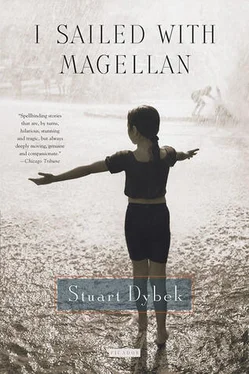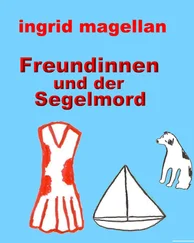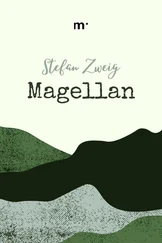Everyone handed in compositions but Chester and me. Sister Lucy didn’t say anything to Chester, but she told me to sign my name on a blank sheet of paper, title it “Christmas Composition,” and below that to write “Dedicated to Ralphie.”
On the last day of class before Christmas vacation, when she returned the compositions, she handed the blank paper to me marked with a red F. Written in red ink was the comment “I see that your gift this Christmas was an ENORMOUS nothing.”
After returning the papers, Sister Lucy placed a scratchy record of carols on the portable turntable, and while it played she announced what we all already knew, that Camille’s essay would represent our class at the Christmas Pageant that year. As was customary, Sister Lucy asked Camille to read her story aloud for our class. Camille rose to read at her desk, but Sister motioned her to the front. Camille was to be our valedictorian, too, the first one ever at St. Roman, and Sister Lucy had begun coaching Camille on her oral delivery in preparation for her speech at graduation.
“A Christmas Carol for Ralphie: A True Story,” Camille read, her quiet voice in competition with the “Ave Maria.” She enunciated carefully, eyes glued to the page, rouge burning on her cheeks. She appeared to be overheating, and she partially unbuttoned the navy blue cardigan she’d taken to wearing over her school uniform.
“Try looking up at your audience from time to time,” Sister Lucy suggested. “Eye contact, that’s the secret.”
Camille’s composition opened with the sound of prancing hooves: not reindeer on a rooftop, she told us, but Tito Guizar on the white stallion following the Virgin down Washtenaw. Listening to her re-create the scene, I wondered if she’d been there. I didn’t remember seeing her, but there had been a crowd of people on the sidewalk watching Tito Guizar. When she came to the part about Sharky leading his parade out of the alley, she looked up at us, her audience, and asked, “What if Charles Dickens, the author of A Christmas Carol —one of the greatest writers in the history of the world — was there in the crowd?”
She dropped her gaze back to her paper. “I think I saw him there that afternoon,” she said, then deliberately making eye contact, asked, “If Dickens can transport us in time back to London, why can’t we transport him to Chicago?”
Maybe eye contact was the secret, because it seemed as if she was asking me the question.
“You don’t have to be transported to London on Christmas Eve a century ago to know that, as Dickens wrote, ‘the business of Mankind is Man.’ You don’t have to be visited by the ghosts of Christmas Past, Present, and Future. But if you were, who would your ghost of Christmas Past be?” she asked. “Each of you has one. What would your spirit of Christmas Present look like?”
She paused as if waiting for an answer, and though I now realized her technique was to make eye contact whenever she asked a question, the question nonetheless seemed directed at me, as if there were a secret connection between us.
Before I could think who my ghost might be, Norky turned in his seat a row over and whispered, “Brigitte Bardot,” then shook his fist as if jerking off and made a demented face, which confirmed the ill effects of masturbation. Otherwise, the class was quiet, everyone intent but Chester, who’d buried his head in his arms as if asleep at his desk.
“Maybe the ghost might be disguised as a blind man who sells newspapers or, instead of dragging chains, comes rattling on a little cart with hooves strapped to his hands,” Camille suggested.
However different our ghosts might be, she said, she guessed that everyone in our class had the same Tiny Tim — Ralphie — and that we needed to be inspired by his example to change the world. To change the world, we first had to change ourselves. We had to make Christmas in our hearts and love one another.
Norky turned, caught my attention, and raised a sheet of paper on which in big letters he’d scrawled: “Estrada has BB’s.”
I hated to admit he was right — maybe it was an optical illusion, but whenever Camille paused for breath, her white blouse beneath her blue sweater seemed to strain against the swell of her breasts as if she were developing before our eyes.
She took a deep, breast-heaving breath and said that a blue boy was not so different from Tiny Tim with his crutch. And that Tiny Tim with his crutch was not so different from Jesus with a cross. She said that on that day last December when he ran to join the band of disabled marchers, Ralphie “mounted the wheelchair like a prince assuming his throne.” She said he raised his blue fist not in triumph or, as some claimed after he died, to wave goodbye, but as if to cheer as Tiny Tim would, “God bless us every one!”
“That’s not what happened,” Chester said quietly.
He lifted his head from his arms and, without asking permission, half rose at his front-row desk.
“Chester, do you want to add something?” Sister Lucy asked, giving him the floor, though it wasn’t necessary, because Camille had immediately stopped reading and now stood as if trapped before the class, more uneasy than I’d ever seen her.
Chester sat back down. “Lots of little kids chase parades,” he said. His voice trembled. “How come for once in his life Ralphie couldn’t just do what other kids do without somebody making it a big deal?”
“Of course he could,” Sister Lucy said. “What Camille meant was—”
“She shouldn’t make stuff up about him,” Chester interrupted, rising to his feet with a force that jarred his desk and sent the needle on Sister’s portable player skipping across vinyl. “He wasn’t joining anything!” he shouted at Camille. “He wasn’t like them. His fist wasn’t blue. That’s bullshit. What do you know?” he demanded. “You don’t know shit! And he hated being called Blue Boy. That wasn’t his goddamn name. He wasn’t some fucking freak. He wasn’t some crip in a story. He didn’t want your fucking feeling sorry for him. We don’t need it. What do you know? You don’t know fucking dogshit! Go fuck your four-eyed self!” he yelled after her as Camille ran from the room.
“How much you soak for it?” my father asked, studying the tree with a characteristic combination of suspicion and contempt.
His appraisal was accurate, it wasn’t much of a tree. The lots were already picked over. Each year we’d shop later in December in order to get a better deal. I’d begun to suspect that, if he could, he would buy a tree on sale after Christmas the way he bought Christmas cards.
“You don’t unload these trees soon and you’ll be stuck with them. You won’t be able to give them away.” As usual, he marshaled his arguments before getting down to talking turkey, applying what he called “psychology,” even though the kid he was bargaining with didn’t own the lot. He was a sullen-looking teenager in a hood who kept his eyes on his own stamping feet. The unclasped buckles of his galoshes jangled; I could smell the resin on his oversize canvas mittens. While we’d wandered through what was left of the tiny pine forest, he hadn’t bothered to leave the flickering, illusory warmth of the garbage can where he stood smoking a cigarette and burning boughs.
During summer, lots like this were eyesores, clotted with trash, ragweed thrusting from bricks and broken bottles. But each December they were transformed — strung with colored bulbs and plastic pennants like used car lots. A horn speaker, blaring maniacally as any from an ice-cream truck in July, crackled “Here Comes Santa Claus.”
“ Maybe I’d go a fin on this one,” my father grudgingly offered.
“I don’t make the prices, mo’,” the kid told him.
Читать дальше












